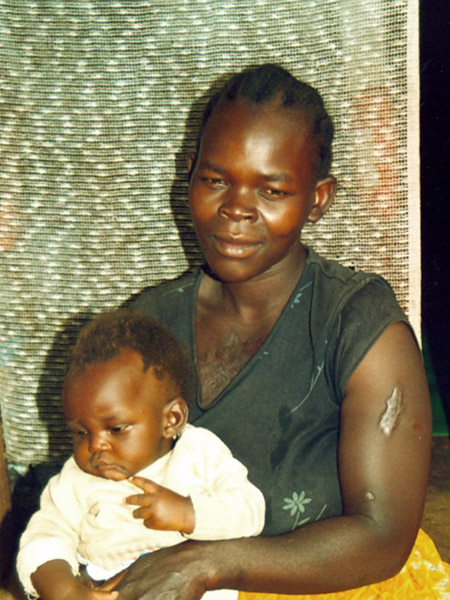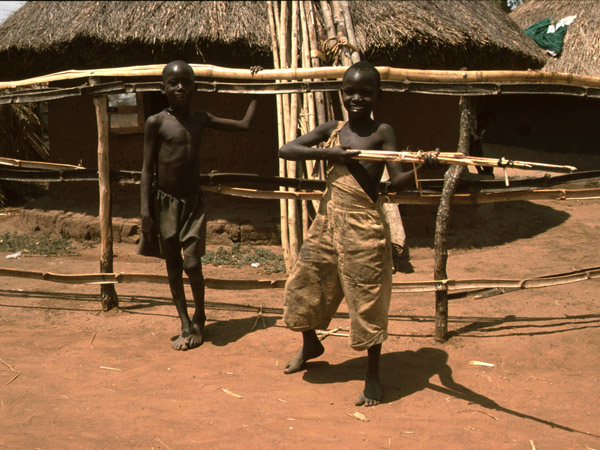The Lord’s Resistance Army: Violence and Christianity in East Africa
Contrast and Complement of Routes to Peace among the Acholi in Northern Uganda
abstract | filmproject "fighting spirits" | keywords and concepts | links and literature | researcher
abstract
In the post-colonial African context the relationship between religion and politics presents itself in culturally specific but often also violent forms. In the case of the conflict in northern Uganda Christian religious content (the trinity) is referred to on the basis of the traditional belief in spirits. In this so-called “ethnic” conflict it is by means of “rituals” that rebels are both recruited and also re-socialized into their home communities. An analysis of the conflict can elucidate the various societal discourses of the northern Ugandan war. Territorial aspects and processes of migration, discourses of ethnic and religious identity, political affiliations and aspects of powerlessness as well as access to resources form a complex bundle of root causes all playing varying roles in both legitimating violence as well as in the attempts to resolve it.
 In a wider perspective the organization and activities of the Lord’s Resistance Army resemble other conflicts in the region in which aspects of gender, good and bad as well as animated and unanimated nature are being negotiated. Such conflicts can be viewed as the expression of a collective social trauma, of ecological and economic protest and of religious conflict. The leaders of these rebels, “possessed” by spirits, are distinguished by their charismatic personalities and, in the case of northern Uganda, have for twenty years now, been extremely successful at re-interpreting Christian, Muslim and elements of the traditional Acholi religion into strong metaphors. At present there is a marked international interest in the situation of the child soldiers, who are said to compose most of the rebels. The re-socialization of former rebels is an enormous challenge for the society.
In a wider perspective the organization and activities of the Lord’s Resistance Army resemble other conflicts in the region in which aspects of gender, good and bad as well as animated and unanimated nature are being negotiated. Such conflicts can be viewed as the expression of a collective social trauma, of ecological and economic protest and of religious conflict. The leaders of these rebels, “possessed” by spirits, are distinguished by their charismatic personalities and, in the case of northern Uganda, have for twenty years now, been extremely successful at re-interpreting Christian, Muslim and elements of the traditional Acholi religion into strong metaphors. At present there is a marked international interest in the situation of the child soldiers, who are said to compose most of the rebels. The re-socialization of former rebels is an enormous challenge for the society.
Field research in Uganda is aimed at disclosing the role of the Christian motifs of atonement and reconciliation in the process of integration.  A major focus shall lie on the employment of traditional peace-making rituals of the Acholi and their acceptance by the Acholi. However, the Acholis’ famous cultural capacity for peace is one of various different routes to peace in Northern Uganda. Apart from peace-talks involving the LRA-leaders as well as government representatives the ICC has become involved and issued warrants as a way to bring peace and justice to the Acholi people. These three ‘roads to peace’ are being pursued simultaneously and the research project will try to shed light on the contradictory aspects of this process by collecting information on how people and groups involved comment the current developments.
A major focus shall lie on the employment of traditional peace-making rituals of the Acholi and their acceptance by the Acholi. However, the Acholis’ famous cultural capacity for peace is one of various different routes to peace in Northern Uganda. Apart from peace-talks involving the LRA-leaders as well as government representatives the ICC has become involved and issued warrants as a way to bring peace and justice to the Acholi people. These three ‘roads to peace’ are being pursued simultaneously and the research project will try to shed light on the contradictory aspects of this process by collecting information on how people and groups involved comment the current developments.
The project is part of the research area “violence” within the research-cluster providing an emic perspective on ‘ethnic’, ‘tribal’ or ‘small’ wars, phenomena of violent conflict that can be observed to be on the increase worldwide as well as offering an interpretation of acts of staging of “traditional” rituals in conflicts and their resolution.
filmproject "fighting spirits"

Part of the project focused on making a film on the impact of spirits as root cause for the conflict as well as for conflict resolution. Filming was done from January - February 2009 in Kitgum, Gulu and Kampala.
There is a website with more specific informations, which also contains a trailer. Some still images from the film and the production process can be viewed in the photo gallery.
website/trailer | photo gallery
keywords and concepts
Uganda, Reconciliation, Healing, Conflict and Social Trauma, Rituals, Concept of personhood, Modernity, Migration, Violence
links and literature
For more information on the project please contact me here. Information on recent developments and current discussions can be obtained via the following websites:
- http://www.crisisstates.com
- Nicholas Waddell and Phil Clark (eds.) ‘Courting Conflict? Justice, Peace and the ICC in Africa. Royal African Society Download
- http://www.refugeelawproject.org
researcher
Barbara Meier is a researcher of the Cluster of Excellence ‘Religion and Politics in Pre-Modern and Modern Cultures’ at the Institute of Ethnology. Her present area of interest focuses on the processes of transition from conflict to peace in African societies. Her current research project aims at asking how the Acholi of Northern Uganda make sense of a more than 20-year old history of violence. Another focus of her research is a comparative study of migration from the urban and rural perspective in Ghana and Uganda.

